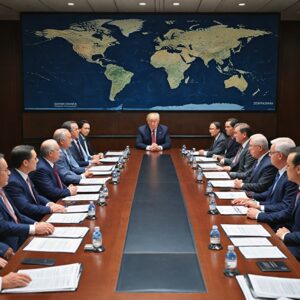Summary
The 2025 Australian federal election took place against a backdrop of significant national and international challenges, including a housing crisis, cost of living concerns, job security in the age of artificial intelligence, and an ongoing trade war with China. Key issues dominating the election discourse ranged from domestic matters such as crime and law enforcement, to complex international trade dynamics and Australia’s relations with major world powers such as the United States and China. Notably, the trade war initiated by former U.S. President Donald Trump significantly impacted Australia due to its interconnectedness within global trade systems, bringing the nation’s economic vulnerabilities and strategic alliances into sharp focus during the election.
Australia’s relationship with China, its largest export market, emerged as a critical aspect of the election, with diplomatic tensions, trade restrictions and geopolitical considerations shaping the political narrative. Amid concerns over China’s increasing use of trade as a political tool and the potential ramifications of a protracted trade war, domestic issues such as the cost of living, housing affordability, and immigration emerged as significant voter concerns, reflecting the intertwined nature of domestic and international issues in the Australian electorate’s consciousness.
The election results were anticipated to influence Australia’s approach to navigating global trade tensions, particularly with regards to its heavy reliance on China and its strategic alignment with the U.S.. Moreover, the election outcome could potentially address Australian voters’ cost of living concerns, which are inextricably linked to broader economic issues, including tariffs, market shares, and international relations.
Looking ahead, the evolving dynamics of global trade, the shifting alliances and the increasing geopolitical proximity of trade partners pose new challenges and opportunities for Australia. With a significant portion of its exports destined for China, and a need for diversification in the face of global supply chain uncertainties, the future of Australia’s trade relations with the U.S. and China will likely remain a vital aspect of the nation’s economic and political landscape.
Background
The 2025 federal election in Australia occurred amid a backdrop of various domestic and international issues, including cost of living, a housing crisis, and the impact of artificial intelligence on job security. Internationally, Australia was contending with a trade war with China that began around 2017 or 2018.
In the lead-up to the election, Australians expressed increased concern over day-to-day living costs, interest rates, and managing immigration and population growth. Concurrently, Australia was experiencing record high immigration, and housing affordability was a significant concern for many Australians.
Australia’s complex relationship with China, featuring strong community and cultural links, played a vital role in the election. The ongoing Australia-China trade war had significant implications for Australia’s economy, particularly the agriculture industry. Despite the political tensions, Australia’s trade fortunes remained tied to China’s economy.
The trade war and broader international trade disruptions were significant factors in the Australian economy, emphasizing Australia’s vulnerability within complex global supply chains.
Impact of Trump’s Trade War on Australian Election
The potential consequences of a trade war instigated by former U.S. President Donald Trump were a key consideration during the Australian Federal Election in 2022. The issue was further complicated by a political scandal in 2018 leading to tighter foreign political influence laws in Australia.
Despite these challenges, experts have suggested that the immediate impacts of a trade war on Australia might not be severe. The Australian government has attempted to mitigate the effects of trade restrictions imposed by China by diversifying its export destinations.
However, the longer-term geopolitical implications of the trade war were a concern, risking pushing Australia into a difficult position. This was reflected in the discourse surrounding the 2022 election, with concerns about China’s influence dominating the political landscape. Domestic issues such as crime and law enforcement also emerged as significant concerns for voters.
Role of China in the Election
During the 2022 election, the relationship between Australia and China was a key focus due to previous tensions and the potential impact on trade.
Australia’s participation in the Quadrilateral Security Dialogue is viewed as an attempt to counter China’s influence in the Asia–Pacific region. Furthermore, a political scandal in 2018 involving Senator Sam Dastyari accepting payments from Chinese donors led to Australia tightening its foreign political influence laws.
China’s trade restrictions have not been limited to Australia alone; other countries like Taiwan, Lithuania, South Korea, and Japan have also faced similar measures.
The Impact of Trade War and Diplomatic Tensions on Key Sectors
Trade disputes, particularly those between the United States and China, have directly impacted key sectors in Australia, including mining, agriculture, and the energy sector.
Mining Sector
Global trade tensions and geopolitical events have led to fluctuations in commodity prices, affecting the revenues of Australian mining companies. A slowdown in the Chinese economy has been cited as the leading risk to the mining and metals sector.
Agriculture and Agri-food Sector
The agriculture sector in Australia has been hit by the ripple effects of the trade disputes, notably impacting Australia’s cotton and barley exports. Tariffs have led to decreased profits for Australian farmers, despite efforts to find alternative markets.
Energy Sector
In the energy sector, China’s unofficial restrictions on coal imports from Australia have not only affected miners in Australia but have also impacted steel producers in China.
Impact on Consumer Costs and Economy
The ongoing trade wars and diplomatic tensions have also led to concerns among Australian voters about the cost of living.
Cost of Living Issues in the Election
The cost of living is a major concern for Australian voters, with 57% of electors indicating ‘keeping day-to-day living costs down’ as the most critical issue in the election. This issue is tied inextricably to other economic matters, including tariffs, market shares, and international relations, particularly with China. These incidents were estimated to have potentially cost the Australian economy about AU$20 billion (US$13 billion) per year, further exacerbating cost of living concerns.
Influence of Election Results on Trade Relations and Economy
Political tensions and economic conditions significantly impact trade relationships, especially between Australia, the U.S., and China. As Australia’s exports face risks in the global trade context, the Australian election results could play a pivotal role in navigating these issues.
Future Trade Relations between Australia, US, and China
As global trade evolves, Australian exporters are likely to face several challenges due to shifting trade partners. It is noted that economies that are geographically closer to China, such as South African and Brazilian iron ore mines and Indonesian nickel mining and smelting, are taking a larger share of the Chinese market. The changing global trade dynamics could further exacerbate existing structural problems for Australian exports to China. Economic conditions in the U.S. also significantly impact the trajectory of these trade relations, with potential repercussions for Australia. Market diversification has emerged as a major trade policy objective for Australia.
The content is provided by Harper Eastwood, Fact-Nest













